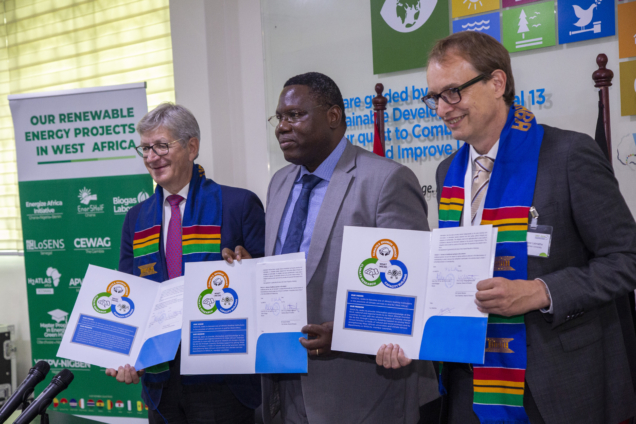
The West African Science Service Centre on Climate Change and Adapted Land Use (WASCAL) in partnership with its German partners, the RWTH AACHEN University, and Julich GmbH, through the German Federal Ministry of Education and Research (BMBF) signed an MoU to have joint activities including but not be limited to the exchange of students and staff, research activities, publications, joint PhD scholarships and Fellowships, the establishment of alumni exchange of academic information and materials in the fields of interest to all partners.
Speaking at the event, Dr. Moumini Savadogo, the Executive Director of WASCAL said “This year we have been experiencing a lot of floods across West Africa, at the same time, there is also a lot of droughts causing a lot of constraint on our food systems. We cannot continue to do same things and expect different results. We need to think of and identify appropriate solutions. Green hydrogen can play a vital role in contributing to alleviating poverty and to minimize gas emissions.”
As a way of fighting the common challenges facing countries across the globe, Chairman, Julich (FZJ) Board of Directors, Prof. Wolfgang said there was the need to collaborate and share knowledge for the common good across continents and national boundaries.
He believed the Green Hydrogen technology is a great selling point for collaboration with its enormous potential to impact not just the energy portfolio but the general economies in the sub-region.
He added that the partnership should not just end at capacity building but move into policy implementation to making an impact and finding lasting solutions to transforming the global challenges.
“We industrialized countries, made a lot of mistakes in the past. We were heavily reliant on fossil energy. May be our joint and diverse experiences will help you not to make the same mistakes. And we learn from you how we can cure the failures and problems we have produced ourselves in the industrialized countries,” he stated.
Explaining what the Green Hydrogen technology was all about, Dr. Solomon Agbo, a scientist with Julich said “it is the energy you can generate from water; the production is clean and the utilization is clean. It is seen as the fuel for the future and has relevance in several sectors of development including transport and agriculture.”
Dr. Agbo said through desalination processes the sea water can even be used in producing Green Hydrogen technology in large quantities, there will soon be pilot projects across the sub-region to demonstrate the potential to generate green hydrogen in Africa which will later be scaled up.
In order to build capacity in the Green Hydrogen technology for students within the West African sub-region, a memorandum of understanding for a two-year Masters programme in Energy and Green Hydrogen was signed between WASCAL and two German-based universities (Julich and RWTH) with support from Germany’s Federal Ministry of Education and Research.
Providing details of the MOU, FZJ Board Chairman Prof. Letmathe said, “the activities of the MOU would include but not be limited to the exchange of students and staff, joint research activities, publications, joint PhD scholarships and fellowships, the establishment of alumni, exchange of academic information and materials in the fields of interest to all partners.
The Master’s Programme is on a competitive scholarship basis and would be awarded to students within the West African sub-region.

